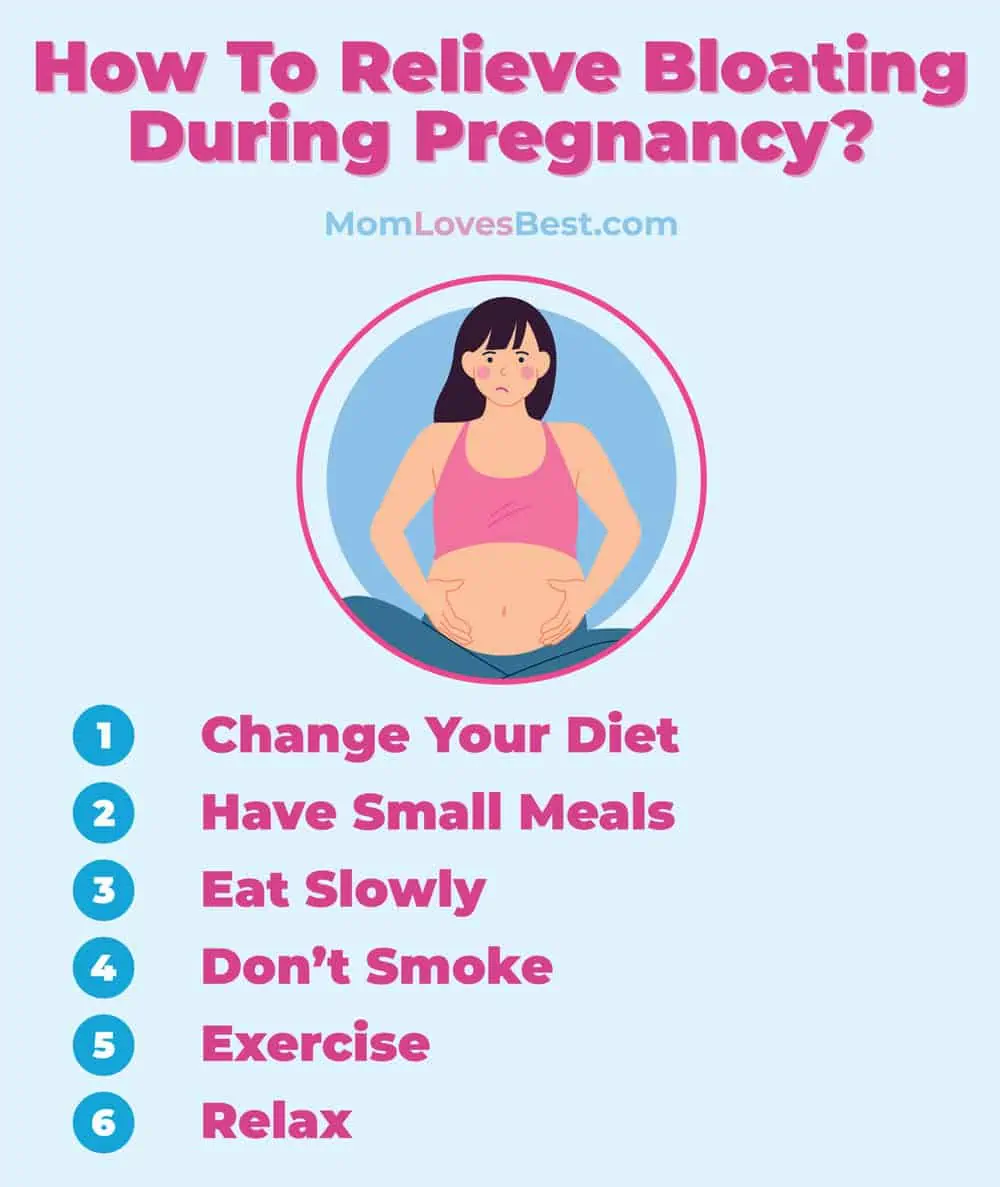Are you 11 weeks pregnant with a belly that looks more like you’re 20 weeks?
Many women experience bloating during pregnancy, and it may last right up until you deliver (1).
As moms, we’ve been there, too. Our experience has led us to further research about bloating in pregnancy, and we’ve discovered some good news. You can learn to manage your bloating and discomfort, resulting in a more enjoyable and comfortable pregnancy!
In this article, we’ll discuss what causes bloating in pregnancy and what you can do to combat it.
Key Takeaways
- Bloating during pregnancy is often caused by increased progesterone levels, which can have some undesirable side effects.
- To relieve bloating, change your diet by avoiding foods that contribute to discomfort, eat smaller and slower meals, and decrease sodium intake.
- Avoid smoking, as it can lead to bloating and other health risks for both you and your baby.
- Stay active and practice relaxation techniques to aid digestion, reduce stress, and minimize bloating during pregnancy.
What Causes Bloating During Pregnancy?
Progesterone is a necessary hormone throughout all stages of your pregnancy. Its levels will continue to rise through all 40 weeks.
In early pregnancy, progesterone helps increase blood flow to your uterus and stimulates the glands in your uterus to thicken and provide nutrients to the growing baby. It also helps your body develop the placenta.
The placenta will start making progesterone on its own as well. This further helps the baby grow, strengthens your pelvic muscles, and prevents your uterus from contracting until it’s time to go into labor.
But while progesterone does many good things for you and your baby, it does have a few side effects that are less than desirable. These include breast tenderness, fatigue, and, you guessed it — bloating.
How Do You Relieve Bloating During Pregnancy?
If bloating makes you uncomfortable, whether physically or every time you walk by a mirror, you can help minimize it.
1. Change Your Diet
Some foods in our diet can contribute to bloat and discomfort, even if they are healthy options. Things like beans and whole grains and vegetables like cabbage, broccoli, and asparagus can increase your bloating. Apples, onions, and tomatoes are all high in fructose, which can also cause discomfort and bloating.
Have you noticed diarrhea as an additional symptom?
If this correlates with an increase in dairy products since you became pregnant, you might be lactose intolerant. Some people with mild intolerance do not notice symptoms unless they increase their dairy consumption.
Decreasing foods high in sodium can also help decrease bloating. During pregnancy, your body has a lot more fluid (blood) than it is used to, and any foods excessively salty are sure to cause extra bloat. So although your baby may have you craving french fries, maybe you can go for carrot sticks with a dip instead. It’s essential to have a well-balanced diet, especially rich in fruits and vegetables.
Editor's Note:
Katelyn Holt RN, BSN, BC2. Small and Slow Is The Way To Go
The larger the meal, the harder it is to digest. Have you noticed you often feel tired after eating a big meal? That’s because of all the energy your body needs to digest all that food (2).
Smaller meals are easier to digest, lessening the tiredness and bloating you can feel after eating. Focusing more on protein, fruits, and veggies and less on carbohydrates will also keep up your energy levels!
Many health care providers suggest pregnant women eat six small meals a day. Frequent meals? Sign us up!
Eating slower can also help because it takes 20 minutes on average for a person’s brain to realize they are full. By eating slowly, you allow your body to send your brain the signal that you are full before you’ve actually overeaten. By not overeating, you can prevent bloating.
3. Don’t Smoke
Doctors recommend women stop smoking before they even try to get pregnant.
It’s widely known smoking can cause a lot of damage to your unborn baby, including limiting their oxygen, low birth weights, an increased risk of respiratory issues, as well as SIDS. But many don’t know it also carries some side effects that can bring some discomfort to you during pregnancy.
Pregnant or not, smoking can lead to bloating because smokers inhale more than their non-smoking counterparts (3). And this air often gets trapped in your stomach or colon.
Get Some Help
4. Get Up And Go
We discussed above how slow digestion can cause bloating, but smaller meals are not the only thing that can help you digest your food faster. A study conducted in 2006 showed gas retention was significantly decreased in individuals who exercise compared to those who don’t (4).
Exercise, even a short walk, can help get your digestive tract moving. You could also try using an elliptical machine or a stationary bike. Even water aerobics can get your digestion up and moving.
Are cardio exercises not your thing? Find another way to exercise to help aid digestion and combat your bloat.
Along with activity, drink lots of water, approximately 10 glasses a day. Drink when you’re thirsty, knowing that other fluids count toward hydration too, but nothing beats a cold glass of water.
5. Relax
Have you ever been in a situation that made you feel nauseated? That’s your gut-brain connection at work (5). It’s a relationship that can go both ways.
Intestinal issues can make you anxious or stressed. But stress and anxiety can also cause intestinal problems.
The enteric nervous system controls your digestion. When your stress increases and your fight-or-flight response is triggered, your central nervous system can tell your digestion to shut down.
How It Works
While a certain amount of stress is unavoidable, you can help to reduce it through several easy methods. Deep stomach breathing can help calm you down in a tense moment, as can yoga.
A simple exercise is to breathe in for four seconds and out for eight, focusing on your breath. Do this 10 times throughout the day to keep you grounded, relaxed, and mindful.
At home, you can cut a few things off of your to-do list and give yourself time to rest and relax. If your stress and anxiety become unmanageable on your own, don’t hesitate to contact your doctor or a therapist to help you through it.
Other Things That Can Help with Bloating During Pregnancy
If you still find yourself feeling puffy and tight, here are a few more things you can try:
- Treat constipation: Constipation is a normal symptom throughout pregnancy, with an estimated 24% of women dealing with it in the first trimester. Constipation can cause stool to build up in your large intestine, which can cause pain, bloating, and discomfort. If you are dealing with constipation, try increasing your water intake, and talk to your health care provider about suggesting a gentle stool softener. Drink lots of water!
- Drink from a glass: When you drink from a bottle or straw, it’s easier to swallow more air that can eventually get trapped in your stomach. Drinking from a cup helps you ingest less air, meaning you will not get bloated as easily.
- Don’t chew gum: You take in air every time you open your mouth to chew, and it’s easy for that air to make its way into your stomach. Try switching out your gum for a mint instead.
- Say no to artificial sweeteners: While fructose can be difficult for many people to digest, some artificial sweeteners like sorbitol cannot be digested at all (6). If you need to sweeten your food or beverage, try a natural option like maple syrup or honey instead.
- Don’t eat right before bed: Eating right before bed has the opposite effect of the get-up-and-move tip we shared earlier. Instead of scarfing down your dinner right before your head hits your pillow, try giving yourself an hour or two between dinner and sleep. Give your body time to start digesting your food and possibly save yourself some discomfort in the morning.
- Stay away from carbonated beverages: Sodas and other carbonated beverages are made by forcing carbon dioxide and water into your drink at high pressure. When you drink a soda, all of those bubbles caused by the carbon dioxide go into your belly and can easily get trapped there. Instead of reaching for a soda, try reaching for a glass of water. If water is too bland for you, add fruits or herbs such as mint to liven it up.
- Walking: Even a light stroll can increase the motility of the gastrointestinal tract, which can decrease constipation, reduce bloating, and increase digestion. It also is an easy way to prepare your body for delivery and keep your muscles loose (7).
FAQs
The Bottom Line
You are not alone! Just as with morning sickness and breast soreness, many moms and moms-to-be have suffered through the same thing you are right now.
While pregnancy is a beautiful and magical event, some of its side effects are less than glamorous.
It might take some changes for you to get relief. But by knowing what you are up against and what things can help, you can hopefully minimize the discomfort that comes with bloating during pregnancy.













